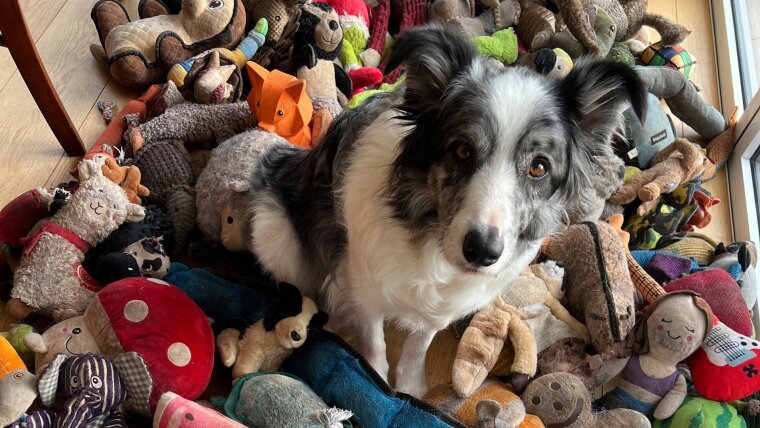
- Research
Published: | By: Diana Leahy/Ute Schönfelder
Dogs that can recognize hundreds of objects by name alone are extremely rare. An international research team from the University of Portsmouth and the »DogStudies« research group at the University of Jena has now investigated for the first time which characteristics distinguish these so-called label learners from other dogs. Their study, which has just been published in the journal »Nature Scientific Reports«, shows that curiosity, targeted focus and controlled behaviour are crucial for a small number of dogs to learn that objects have names.
»Not every dog can distinguish such a wide variety of objects—this ability is extremely rare and seems to be a natural talent«, says Dr Juliane Kaminski from the University of Portsmouth, who led the study together with Dr Juliane Bräuer from the University of Jena.
Citizen science project with dogs from five countries
For the study, the research team searched the world for label learners—and found a total of eleven suitable dogs from the UK, the USA, the Netherlands, Switzerland and Germany. In a preliminary test, the animals had to show that they could reliably select objects by name.
Because these special dogs live far away from each other, the project was carried out as a citizen science study: The owners filmed their dogs in eight standardized cognitive tests, including on problem-solving behaviour, learning ability, memory performance and reactions to new objects. At the same time, the research team carried out the same tests with a control group of comparable dogs of the same age with no particular label learning ability.
The analysis revealed clear differences between the two groups. In addition to curiosity—an exceptionally strong interest in new objects—the label learners were also characterized by special attention to individual objects and the ability to suppress spontaneous preferences.
»I am not surprised that this suppression of spontaneous preferences plays a role«, says Dr Juliane Bräuer, who recently moved from the Max Planck Institute for Geoanthropology to the University of Jena with her research group. »Most dogs can hardly ignore favourite objects—this makes it difficult for them to learn.«
Significance for assistance dog research
The results of the current study also have practical relevance. They could form the basis for future procedures that provide indications of special learning abilities in young dogs—for use as assistance or therapy dogs, for example. In addition to object naming, the researchers at the University of Jena are currently investigating, among other things, how dogs read human emotions and how human-dog interactions differ culturally.
Participation in future studies
The »DogStudies Jena« research group is always looking for new test subjects: dogs and their owners who register to be invited to take part in tests. Information can be found at https://www.fsv.uni-jena.de/en/66220/dogstudies. Registration is possible at juliane.braeuer@uni-jena.de.
For further studies on label learners, the research team is also looking for dogs that possess this extraordinary ability. Owners of such dogs can get in touch at findingricodogs@gmail.com.
Original publication:
Kaminski, J., Capitain, S., Kühr, F. et al. What makes a dog a label-learner: individual cognitive differences underlying label-learning abilities in domestic dogs (Canis familiaris). Sci Rep 15, 41616 (2025). https://doi. org/10.1038/s41598-025-25646-5External link
Contact:
07743 Jena Google Maps site planExternal link